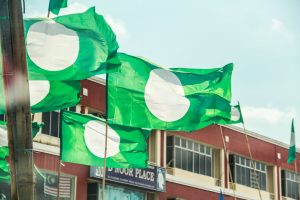At the time of writing, Malaysia remains in political limbo after the country’s fifteenth general election delivered a hung parliament. With none of the major parties or coalitions able to form a government on their own, the country awaits the intervention of the country’s king to decide whether the next government will be headed by a multiethnic, progressive bloc led by veteran opposition leader Anwar Ibrahim, or a conservative Malay Muslim coalition led by former prime minister Muhyiddin Yassin.
But whoever ends up forming the next government, the election has been a clear success for the conservative Parti Islam Se-Malaysia (PAS), Malaysia’s foremost Islamic political party. In the November 19 election, PAS won 49 of the 222 seats in the Malaysian parliament, the largest return for a single party. This is more than double the 18 seats that the party won in 2018, when the United Malays National Organization (UMNO) and its Barisan Nasional (BN) coalition were defeated for the first time since independence in 1957.
Hitherto confined mostly to four Malay-majority states in the northern part of the Malay peninsula, PAS, which advocates the introduction of Sharia law and advances a notion of Malaysian identity that is narrowly Malay and Islamic, has now established itself as a national political force, with unknown implications for the future of Malaysian politics.
PAS appears to have been the main beneficiary of the stunning collapse of UMNO and its BN coalition. Despite losing to the reformist Pakatan Harapan alliance at the last general election in 2018, its first defeat since independence in 1957, caretaker Prime Minister Ismail Sabri Yaakob and the UMNO leadership were optimistic that BN could re-establish its predominance after strong showings in a string of state-level elections. Instead, GE15 saw UMNO/BN washed from the map. The coalition won just 30 seats, down from 79 in 2018 and 133 in 2013.
What explains PAS’ strong showing? Much has to do with the party’s success in contrasting itself with the corruption and in-fighting of the established Malay parties, particularly UMNO. They party has never really recovered from the billion-dollar 1MDB corruption scandal, which contributed to the downfall of former Prime Minister Najib Razak in 2018, and his eventual imprisonment earlier this year. Meanwhile, UMNO President Ahmad Zahid Hamidi has only recently cleared himself of multiple bribery charges and is deeply unpopular in many Malay kampongs.
Much can be put down to the fact that the PAS is in many ways more than just a political party. It runs a network of kindergartens and childcare centers and has over the years gradually built up a formidable grassroots political presence. Perhaps counterintuitively, from a Western perspective, its election campaign successfully harnessed the support of women and youth in rural parts of peninsular Malaya, including in the three states it already controls: Kelantan, Terengganu, and Kedah.
This may also have contributed to the fact that PAS was also one of the main beneficiaries of the record influx of first-time voters due to the recent lowering of the voting age from 21 to 18 and the introduction of automatic voting. It is an important reminder that young voters are not necessarily more inclined to vote for more progressive, pluralist parties, especially when they dwell in rural areas.
PAS’ success signifies that while UMNO, the standard-bearer of Malay nationalism, has perhaps entered a terminal decline, the politics of Ketuanan Melayu (Malay supremacy) that delivered it a virtual permanent majority from 1957 to 2018 remains very much alive. Indeed, the surge of support for Malaysia’s largest Islamic party indicates that Malay identity is increasingly being seen, and expressed, in explicitly Islamic terms.
The impacts of PAS’ success are hard to measure, especially given the current unresolved political situation. If the party enters government, its strength will be such that it will likely be able to demand key cabinet positions, through which it could proselytize and extend its exclusivist vision of Malaysian identity. Even if it remains outside government, GE15 has announced it as a national-level political player, with the potential of capturing more of the ethnic Malay vote from the corrupt, rusted-on Malay political class.
Over the longer-term, it is hard to know if the resurgence of political Islam is likely to continue, or encounter the built-in limits imposed by Malaysia’s multi-ethnic realities. But at the very least, it seems set to deepen the ethnic divides that have existed in the country since independence, with potentially deleterious impacts in the years to come.
One alarming sign was provided by a coordinated anti-Chinese social media campaign that was reportedly launched in the days after the weekend’s election. According to a coalition 0f civil society groups, the campaign of inflammatory posts, most of them on TikTok, which the groups said were “well-coordinated and resourced,” agitated against the predominantly ethnic Chinese Democratic Action Party, a key component of Anwar’s Pakatan Harapan coalition, and called for Muhyiddin’s Perikatan Nasional coalition, which includes PAS, to take power. Most ominously, the social media campaign also referenced the racial violence that took place on May 13, 1969 in Kuala Lumpur, claiming the lives of dozens and entrenching further the country’s ethnic fault lines.
“These contents using the May 13 incident are creating fear, polarizing the already divided society along racial and religious lines, and at times inciting outright violence while leveraging the deepened social tensions,” the civil society groups said.

































